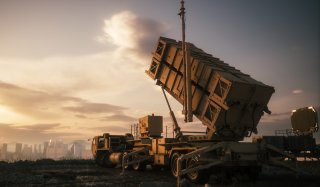Israel’s Iron Dome is Great But It’s No Cure-All
The Iron Dome can be overwhelmed.
Israel must always stay on the cutting edge of military technology. One key capability in which Israel is a world leader is ballistic missile defense.
The Israeli military deployed a comprehensive defense system before even their American partners could.
Iron Dome was developed in 2006 courtesy of a grant by the U.S. Department of Defense. It was a response to Israeli failures in a war against Iran-backed Hezbollah in Lebanon.
The system was operational by 2011.
Iron Dome evolved to become a true defender of Israel. It intervened against rocket attacks from Hezbollah in Lebanon and Hamas in the Gaza Strip.
Effective Defense?
Israel claims this system is 90 percent effective in defending an area from enemy missile attack, although Hamas and Hezbollah have shown on a handful of occasions that the system has limits.
Notably, it can be overwhelmed by swarming tactics.
This is why Israel (and the United States) are now looking at replacing the Iron Dome with an even more sophisticated system that uses lasers to shoot down incoming projectiles.
That system, however, is in its very early stages of development. Given how poorly the United States has done in developing a directed energy weapon (DEW), the Israelis will have their work cut out for them.
Again, though, because of the rough neighborhood they exist in, Israelis usually have to be significantly more innovative than most other countries when their survival is on the line.
Iran Builds the “Precision Project”
In fact, one could argue that the Iron Dome has not yet had to contend with the true potency of the kind of swarming tactics that Iran’s terrorist proxies, notably Hezbollah, can unleash upon the Iron Dome. In my 2023 book, The Shadow War: Iran’s Quest for Supremacy, I detailed the extent of what both Hezbollah and the Islamic Revolutionary Guard Corps have called their “Precision Project” in Lebanon.
Hundreds, possibly thousands, of medium-and-long-range precision-guided missiles have been built by IRGC manufacturers at Hezbollah sites.
These systems are purposely designed to inflict maximum damage on Israeli soft targets in order to stunt the will of the Israelis to resist, as well as to break Israel’s economy. For example, one primary target for these precision munitions is ammonium nitrate storage tanks at the Port of Haifa. Hitting these would produce a blast similar to that of a dirty bomb, rendering the economically vital port unusable.
Hezbollah’s precision-guided munitions could overwhelm Israel’s Iron Dome defenses, inflicting massive casualties on the Jewish democracy. That’s why, by the way, the Israelis need a robust multinational coalition to assist in its territorial defense. The more players, and the farther afield, the greater the layer of defense is around Israel. Not only does Israel have Iron Dome helping it, but it also has the capabilities of Saudi Arabia, the United Arab Emirates, and other Arab states that are willing to shoot down missiles fired from elsewhere in the region. Plus, Israel relies upon warplanes from the United States and the United Kingdom to augment its defenses.
Iron Dome Will Be Overwhelmed
Regardless, even these capabilities are not a panacea. The Iron Dome can be overwhelmed. Other regional parties may opt out of defending Israel. The Americans and British might not be able to intercept all the missiles fired at Israel.
Suddenly, that 90 percent success rate might go down significantly for the Iron Dome.
Undoubtedly, the Iron Dome system is a technological marvel and a testament to the genius of Israel’s defenders. Yet it has its limits, and those limits are at risk of being reached. What’s more, the Iron Dome has never been tested against nuclear weapons.
And while the likelihood is low that Iran or any other power would launch nukes at Israel, the fact that Iran has long had a nuclear weapons capability that is rapidly advancing means the threat cannot be ruled out.
It is incumbent upon Israel and its allies to figure out a better, more robust system. A DEW defensive capability is likely one excellent possibility.
Brandon J. Weichert, a National Interest national security analyst, is a former Congressional staffer and geopolitical analyst who is a contributor at The Washington Times, the Asia Times, and The-Pipeline. He is the author of Winning Space: How America Remains a Superpower, Biohacked: China’s Race to Control Life, and The Shadow War: Iran’s Quest for Supremacy. His next book, A Disaster of Our Own Making: How the West Lost Ukraine, is due October 22 from Encounter Books. Weichert can be followed via Twitter @WeTheBrandon.
Image: Shutterstock.

